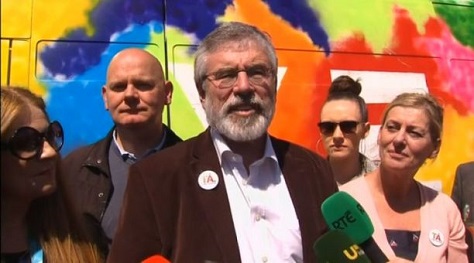There’s no doubt that the landmark vote in Ireland on May 22, the first such referendum where a popular majority enacted same-sex marriage, has been received as a huge step forward for marriage equality and LGBT rights in Europe.![]()
![]()
While the United States supreme court is set to rule later in June on marriage equality as a legal and constitutional matter within all 50 states, it may feel like a watershed moment in Europe as well, where French president François Hollande and the center-left Parti socialiste (PS, Socialist Party) and British prime minister David Cameron and the Conservative Party both swung behind legislative efforts to enact same-sex marriage, in 2013 and 2014, respectively.
Luxembourg’s prime minister Xavier Bettel officially married his own partner in May, but it was only six years ago that Iceland’s Jóhanna Sigurdardóttir became the world’s first openly LGBT head of government, followed shortly by Belgian prime minister Elio Di Rupo.
Yet the lopsided Irish referendum victory — it passed with 62.07% of the vote and the ‘Yes’ camp won all but one constituency (Roscommon-South Leitrim) — obscures the fact that additional marriage equality gains across the European Union will be slow to materialize. Leave aside the notion, now reinforced by Ireland, that the human rights of a minority can be legitimately subjected to referendum — a precedent that Europeans may come to regret. Amid the recent burst of marriage equality in Europe, the immediate future seems grim.
Nowhere is that more true than just next door in Northern Ireland, which is the only part of the United Kingdom that doesn’t permit same-sex marriage. With the Protestant, federalist electorate dominated by the socially conservative Democratic Unionist Party (DUP), one of western Europe’s most harshly anti-LGBT political parties, there’s little hope that Northern Ireland will follow in the footsteps of England, Scotland and Wales. At the end of April, Northern Irish health minister Jim Wells was forced to resign after suggesting same-sex couples were inferior parents. It’s home to the late Ian Paisley’s ‘Save Ulster from Sodomy’ campaign in the late 1970s, and it’s where sexual relations between two consenting same-sex partners were illegal until 1981, when the European Court of Human Rights ruled that Northern Irish law violated the European Convention on Human Rights.
But Northern Ireland is not alone in its reticence — marriage equality faces long hurdles in some of the European Union’s most important countries, including Germany, Italy and Poland.
The irony is that despite Europe’s leading role two decades ago on LGBT marriage rights, the United States could eclipse Europe with the supreme court’s ruling in Obergefell v. Hodges, as the European Union struggles for years to enact consistent marriage equality legislation. Continue reading After Irish vote, what next for same-sex marriage in Europe?

